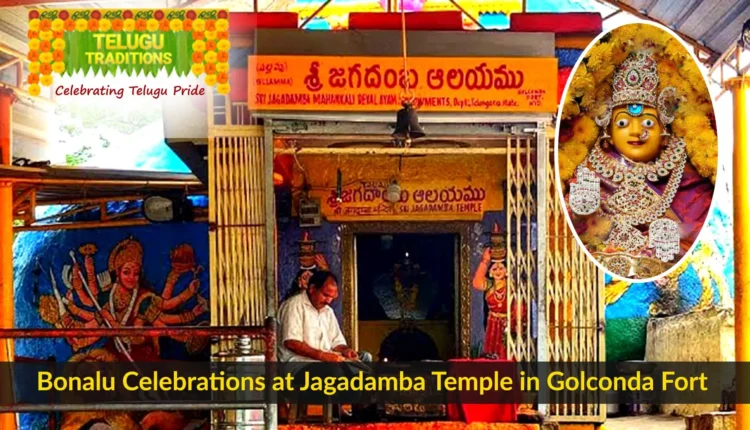Bonalu : The rich cultural tapestry of India is adorned with numerous vibrant festivals, each reflecting the diverse traditions and customs of different regions. Bonalu, a significant festival celebrated in Telangana, holds a special place in the hearts of the people. Among the many locations where Bonalu is celebrated with great fervor, the Golconda Bonalu at Jagadamba Temple at Golconda Fort stands out as a symbol of devotion and cultural heritage. This essay explores the Bonalu celebrations at Jagadamba Temple, delving into its historical significance, rituals, and the spirit of unity and devotion that characterizes this joyous occasion.
What this article contains?
Historical Significance
Golconda Fort, located in Hyderabad, Telangana, is an architectural marvel steeped in history. Golconda Fort, often referred to as the “Diamond Fortress,” derives its name from the Telugu words “Golla Konda,” which means “Shepherd’s Hill.” Originally a mud fort built in the 12th century, it underwent a remarkable transformation under the Qutb Shahi dynasty, who established their capital in the region in the 16th century. The fort grew in size and scope, reaching its zenith as a formidable stronghold and a center of flourishing trade and culture.
The Jagadamba Temple, situated within the fort complex, is dedicated to the Hindu goddess Jagadamba, also known as Mahakali or Yellamma. This ancient temple holds immense spiritual and cultural importance, drawing thousands of devotees during the Bonalu festival.
Golconda Bonalu Festival
Bonalu is predominantly celebrated in the month of Ashada (July-August) and is a grand tribute to the goddess Mahakali. The festival is a unique blend of devotion, music, dance, and traditional rituals. It is an occasion when people offer their gratitude and seek blessings from the goddess for prosperity, health, and well-being.
Rituals and Celebrations
The Bonalu celebrations at the Jagadamba Temple begin with the ‘Ghatam’ ceremony, where a large pot decorated with neem leaves, turmeric, and vermillion is sanctified. The pot is filled with rice, jaggery, curd, and water, symbolizing fertility and abundance. This pot is then carried on the head by a priestess known as ‘Potharaju’ amidst lively music and dance performances.
The Potharaju, dressed in traditional attire, dances energetically to the rhythm of drums, invoking the goddess’s blessings. Devotees, both men and women, follow the procession, carrying Bonam (a pot filled with cooked rice, jaggery, and curd), offering it to the goddess at regular intervals. The rhythmic beats of traditional instruments like dappu, thakita, and panchavadyam reverberate through the air, creating an atmosphere charged with devotion and joy.
The highlight of the Bonalu festival is the ‘Rangam,’ a unique oracle ritual. A possessed woman or ‘Bonam Aata’ acts as a medium, embodying the goddess’s spirit. She provides guidance, predictions, and blessings to the devotees, who seek her counsel with faith and reverence.
Unity and Devotion
Bonalu celebrations at Jagadamba Temple bring people from various walks of life together, transcending barriers of caste, religion, and social status. It is a time when the community unites to offer their devotion and express their cultural identity. Devotees fervently participate in the festival, regardless of their age or gender, showcasing the inclusive nature of the celebrations.
The Bonalu festival serves as a reminder of the collective strength and harmony that can be achieved through shared celebrations. It encourages social cohesion, cultural preservation, and the fostering of deep bonds within the community. The sense of devotion and togetherness during the festival amplifies the spiritual experience and creates a lasting impression on the participants.
The Bonalu celebrations at the Jagadamba Temple in Golconda Fort exemplify the vibrant cultural heritage and religious fervor of Telangana. The historical significance of the temple, coupled with the lively rituals and unity of the devotees, make this festival a spectacle of faith, devotion, and celebration
Also Read : Lord Venkateswara Swamy : A Captivating & Ancestral Deity

